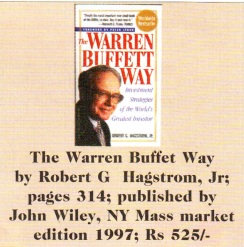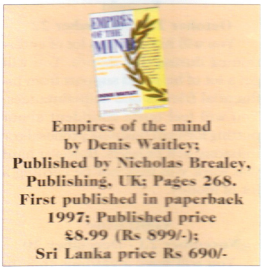Vijitha Yapa

With the rocking of a number of Asian currencies in the last weeks and the leaps made in the Colombo bourse, the appearance of the “Warren Buffet Way’ describing the investment strategies of what many consider the world’s greatest investor is timely. He needs no introduction but suffice to say that Forbes magazine dubbed him ‘The richest person in America and an investment genius on a scale that the world rarely sees.”
For those not familiar with the name Warren Buffet, his net worth is well over US$10 billion. But he is not based in New York. He operates his company, Berkshire Hathaways, from where he was born in Omaha, Nebraska. He has no chauffeur to drive him around. He prefers to drive and also do his own taxes.
When the Tata group began to invest in tea estates in Sri Lanka, it was known they were willing to pay even higher prices to secure the lands they bought. Their strategy is buy and hold-if necessary for many years. One day, the investment will reap in millions. This is exactly what Buffet does – it is the core of his approach. Buy a business, hold it for some years and turn it around and sell it, if necessary, at the right time. For skeptics, his success and how he became a billionaire by practicing this philosophy is now history.
Buffet says ‘what I do is not beyond anybody else’s competence.” But his critics say his idiosyncrasies prevent his investment approach from being widely adopted. But the author, while admitting that Buffet is idiosyncratic, disagrees with the critics and says that once Buffet’s methodology is understood it can be applied successfully by individuals and institutional investors.
His father was a stockbroker. Warren showed early signs of being a genius by keeping track of mathematical calculations in his head and at the age of 8, was reading his father’s books on the stock market. He bought his first stock at the age of 11.
His entrepreneurship was evident when at 13 he delivered news papers in the mornings and invested in 2 pinball machines for US$50 and installed them in local barber shops. Soon, he had 7 machines and was earning US$50 a week, a princely sum during world War II. He then joined with a friend, bought a Rolls Royce for US$350 and hired it out for US$35 a day. By the time he graduated from high school at 16, he had saved US$6000.
One book which influenced Buffet was the Intelligent Investor by Benjamin Graham. Graham had a simple philosophy. Realizing the importance of understanding a company’s intrinsic value, Graham preached that investors who accurately calculated this value and bought shares below it were better off.
The book delves into details of how Buffet analyses companies. How Buffet chooses stock is one example to illustrate the many lessons to be learnt from the book. Graham taught Buffet the importance of buying stock only when the difference between its price and its value represented a margin of safety. This philosophy protects one from downward price risk. If the value of a business is slightly higher than its per share price, he will not buy it. The reason he gives is that if the intrinsic value were to dip even slightly because he misappraised the company’s future cash flow, eventually the stock price would drop too. It could even drop below what he paid. But if the margin between the purchase price and the intrinsic value of the company is large enough, the risk of declining intrinsic value is less.
The book is recommended for those who want to make money on the stock market. Whether it is for fly-by-night investors who want to make a quick buck or more long term investors, there are many tips to be picked up from this book. Buffet says, ‘the market, like the Lord, helps those who help themselves. But unlike the Lord, the market does not forgive those who know not what they do.

‘Empires of the Mind,’ subtitled lessons to lead and succeed in a knowledge based world, is the latest book by Dennis Waitley, the author of the bestseller The Dynamics of Winning.” He explains his philosophy at the outset. “With knowledge now the key raw material for creating all economic wealth, the new power struggles will reach deep into our minds and our personal lives. That’s why we believe the only empire that will survive in the 21st century will be the empire you build with your own mind.”
He shows how the world is changing by focusing on specific areas. Yesterday, natural resources defined power and those who dominated the world were those who controlled natural resources. Today, knowledge is power and being ahead of the game is a key factor. Yesterday, leaders commanded and controlled. Today, leaders empower and coach. Yesterday, employees took orders. Today, teams make decisions. The basic message Waitley drives home again and again through the pages of his book is that through self-leadership, one’s career can be improved and personal goals can be achieved, but a key factor he stresses is that nothing is more urgent and important than integrity and wisdom in this borderless world.
What comes out strongly in the book is that in today’s world, knowledge is the key and ignorance will be even more of a tyrant and enslaver than in the past. He talks of time starvation, with greater effort needed to merely stay even. Changing standards mean yesterday’s world records today’s entry level requirements.
He emphasizes the power of the brain which is under utilized. Russian scholar Ivan Yefremov believes that ‘throughout our lives, we use only a fraction of our thinking ability. He says that ‘we could, without any difficulty whatever, learn 40 languages, memorize a set of encyclopedias from A to Z and complete the required courses of dozens of colleges.”
Then what prevents us using our brains more? Many think it is not worth the time and effort. Low self-esteem becomes a devastating inhibitor of growth. Waitley says the only way to obtain knowledge is through study which for most people is like paying taxes. ‘It’s an activity they don’t like and won’t tackle unless absolutely necessary.”
For those who spend their lives erecting monuments to their progress or building empires, Waitley has a word of warning. ‘At the end, most of us discover that what others really cared about was a shared vision, not a selfish vision. For a vision to be inspiring and worth sharing, it needs to bring out the best in all of us, not pander to the worst in us. In order to gain the respect of others we must first earn it. We must be respectable. In or der to be a role model, we must set a positive example. In order to lead others, we must first lead our selves.”
Each chapter begins a few questions which conditions your mind to the tasks ahead.
He invites readers to look into the mirror and ask themselves who is responsible for their successes or failures. The title of his book becomes clear when he says that the empires of the future will not be built of concrete with walls of stone, turrets, armies and gates but with empires of the mind.
Socrates argued that knowledge is the sole good and ignorance is the sole evil and that individuals should cultivate strong personal character and many personal virtues. Waitley believes in this but the application to the 21st century requires new forms.
He issues a warning to those who think of themselves as experts. Instead of being driven by curiosity you become driven to defend what you have previously researched, invented, created, marketed or published. The danger signal is when one begins to recite safe answers instead of saying ‘I don’t know.’
Sri Lankans are familiar with the works of Stephen Covey. In his book, ‘Seven Habits of Highly Effective People.’ Covey examines the word responsibility responsibility, the ability to choose your response. Stephen Covey says that highly proactive people recognize responsibility. “They do not blame. circumstances, conditions, or conditioning of their behavior. Their behavior is a product of their own conscious choice based on values, rather than a product of their conditions based on feeling.”
Waitley takes to task blame fixers and says it’s a juvenile mind that blames others whether it be parents, bosses, companies, immigrants (or races) fate, weather, bad luck, the government or the horoscope. The mature mind asks what is within me that caused it to happen and questions like ‘what did 1 fail to consider? what can I do better next time?”
The book will be an eye opener to many, because of many home truths. After all, in Sri Lanka, whichever political party is in power, we too subscribe to the philosophy, ‘It’s not whether you win or lose(on political or economic fronts), but how you placed the blame.’
Vijitha Yapa, chairman of the Vijitha Yapa Group of Companies, is founder- editor of 3 national newspapers (The Is- land, Sunday Island and Sunday Times). He is Sri Lanka’s correspondent for a number of foreign publications including The Times, London.



